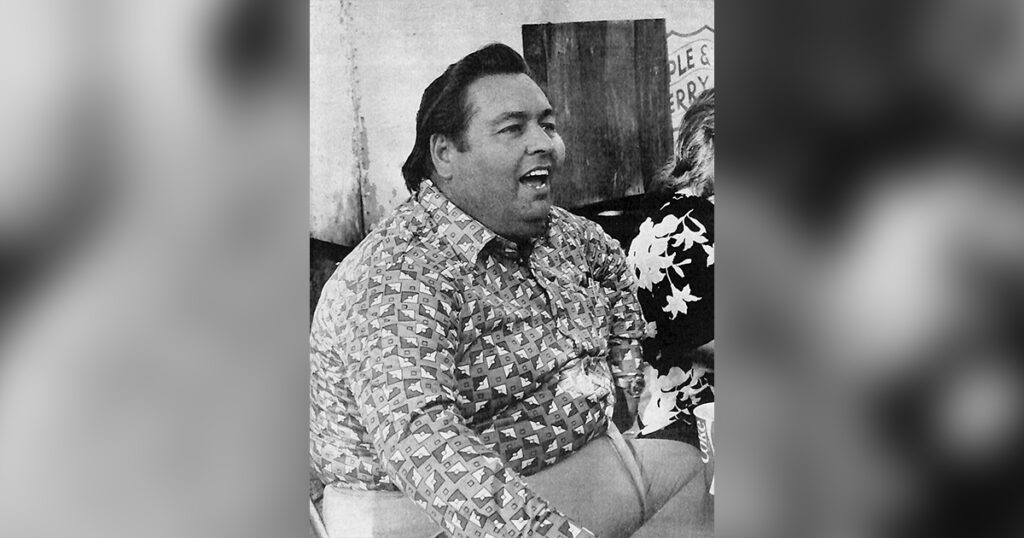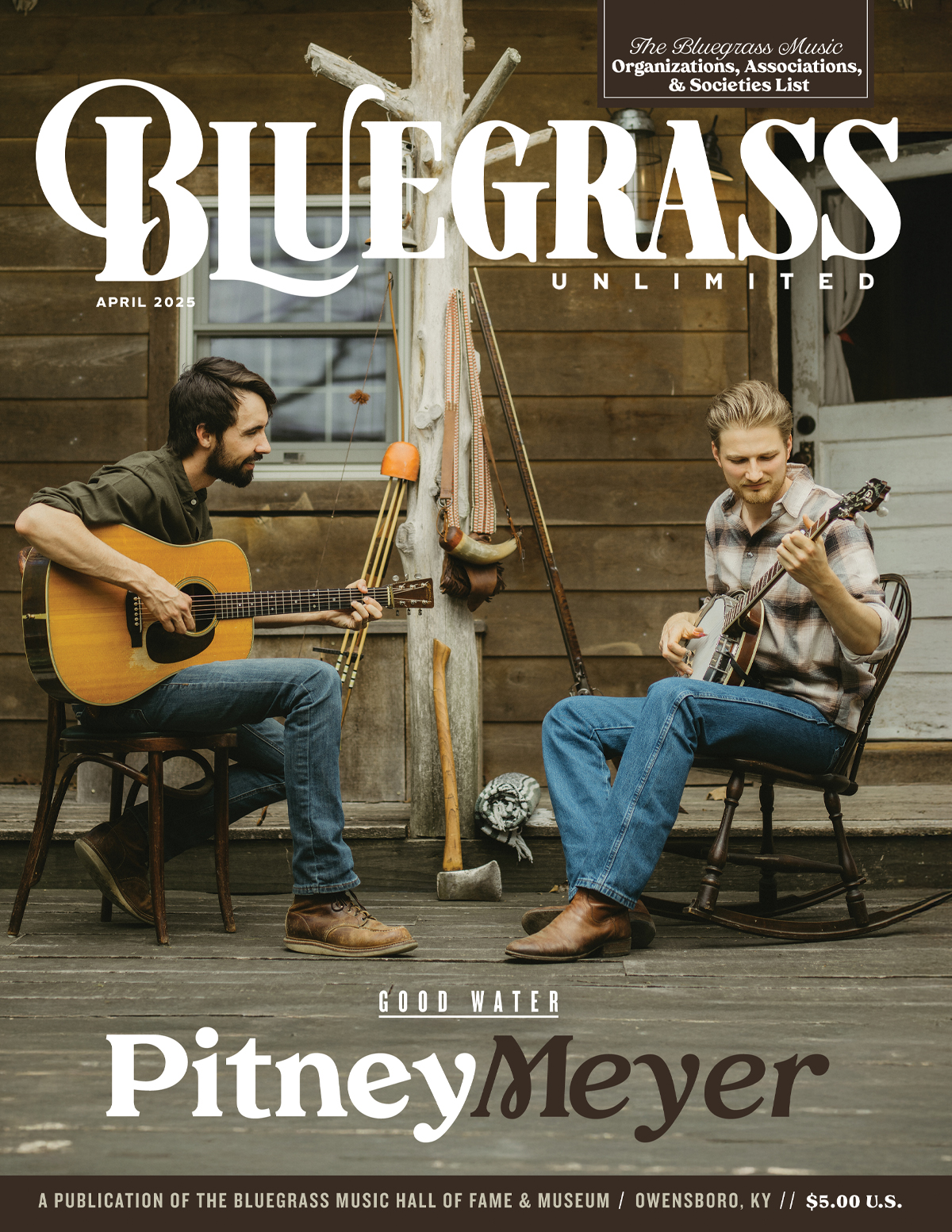Home > Articles > The Archives > Chubby Anthony —Making that Fiddle Sing
Chubby Anthony —Making that Fiddle Sing
Reprinted from Bluegrass Unlimited Magazine
February 1979, Volume 13, Number 8
In the Southern part of the nation, they still talk about that sunny, Sunday afternoon in north Georgia in 1977 when Sonny and Bobby Osborne invited a Florida fiddle player named Chubby Anthony on stage with them to perform a set consisting almost totally of old bluegrass and country songs.
Those who were present that day in Lavonia, Georgia at the Shoal Creek Music Park regard that combination of The Osborne Brothers with Anthony as being one of the high points of bluegrass music history.
Sonny Osborne later commented, “We never get the opportunity to do that many numbers from the past. People want you to do your familiar stuff. We love to pick the old numbers, though, because we grew up on those songs. I was sitting with Bobby in our camper just before our final set of the festival, and I told him since Chubby Anthony was here, we ought to do some old songs. I fully intended that set to do as many old numbers as we knew. We had the attention of the crowd that afternoon, and we used it. That’s the way you get old bluegrass music over to the masses. I enjoyed that set more than anything we have done in years.”
On stage that set, Sonny told the audience, “Back in the old days, we had great fiddle players like Benny Martin and Chubby Wise. Now a days, we’ve got Joe Meadows and Chubby Anthony.”
Who is this Chubby Anthony, and why is Sonny Osborne saying nice things about him?
The simple answer is Anthony is one of the hottest fiddlers on the bluegrass music scene today. He combines talent with repertoire to produce a total effect of a musician who definitely knows what he is doing.
Frank J. Godbey, reviewing an Anthony album in the November (78) issue of Bluegrass Unlimited, put it well when he wrote, “Chubby Anthony is a bluegrass musician. His total effort is in the application of the fiddle (or any other instrument he’s playing) to bluegrass music… He is very much of the same school as Benny Martin or the late Scott Stoneman in the way he handles his instrument. There is a passion in his playing that would not come out if he played like Kenny Baker, for example… As a fiddle album, there may be others that, for some, would be more satisfactory, but as bluegrass music, this can’t be beat.”
Anthony is often mistaken for fiddle player Chubby Wise due to the similarity of nicknames, similarity of weight and since both are from Florida. Wise was born there, while Anthony, who was born in North Carolina, lives in Florida now. Once a music fan hears Anthony, though, there is no trouble in remembering him because of his distinctive style and friendly personality.
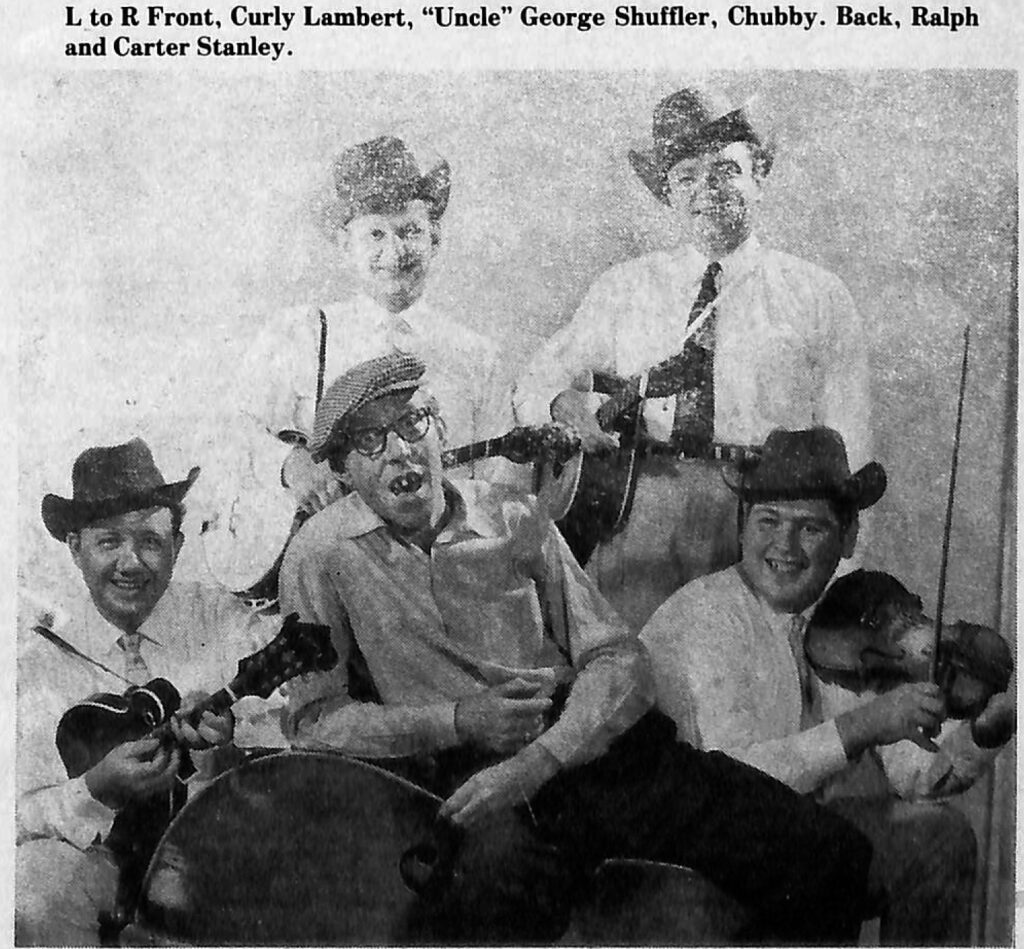
He was sitting at his record table under some trees at the Shoal Creek Music Park at Lavonia, Georgia, when he paused to discuss his career and his philosophy about good performances.
Our conversation started with a reminiscence of the summer a year earlier when Anthony joined The Osborne Brothers on the stage a short distance from where we were talking. “That really was one of my bigger moments. The setting was perfect, being outdoors on a pleasant afternoon and being on stage with Sonny and Bob Osborne, who are no doubt two of the best performers around.
I was just trying to do my share.”
He continued, “The mood you get in creates a lot of difference. The people you are working with, the surroundings and the audience set that mood.”
Talking about his early life, Anthony remarked, “You know, The Lewis Family and I are from the same place. I was born in Lincolnton, North Carolina though, and they are from Lincolnton, Georgia.”
The 43-year-old musician was born Donald Lee Anthony. His grandfather was named David Lee, and his grandmother didn’t want him to have the same name, so his mother named him Donald.
“I grew up near Cherryville, North Carolina (not far from the area where Earl Scruggs was raised), and I lived there until about 1951. It was more or less a cotton mill part of the world. I worked in a cotton mill for a year-and-a-half, but I wanted to play music for a living. My father, Woodrow Anthony, was a back porch picker. He played what I call a violin and had a habit of playing (that) I got from him. In the old days, a fiddler would tuck his instrument under his arm when he played, but a violinist tucked it under his chin. My dad called what he played a fiddle, though. He started teaching me the fiddle when I was five or six.
“My dad worked in the spinning room of the cotton mill as a doffer. That’s a person who takes the empty bobbins off the frames and puts full ones on. My mother (Edith Anthony) worked in the winding room keeping the frames running. She wasn’t a musician, but she just loved to hear music. She was the one who pushed me to practice when I didn’t really want to practice. She’d tell me it was for my benefit. Generally, though, she didn’t have to hunt for me to get me to play. I would most often be out in the yard with a guitar or a fiddle.”
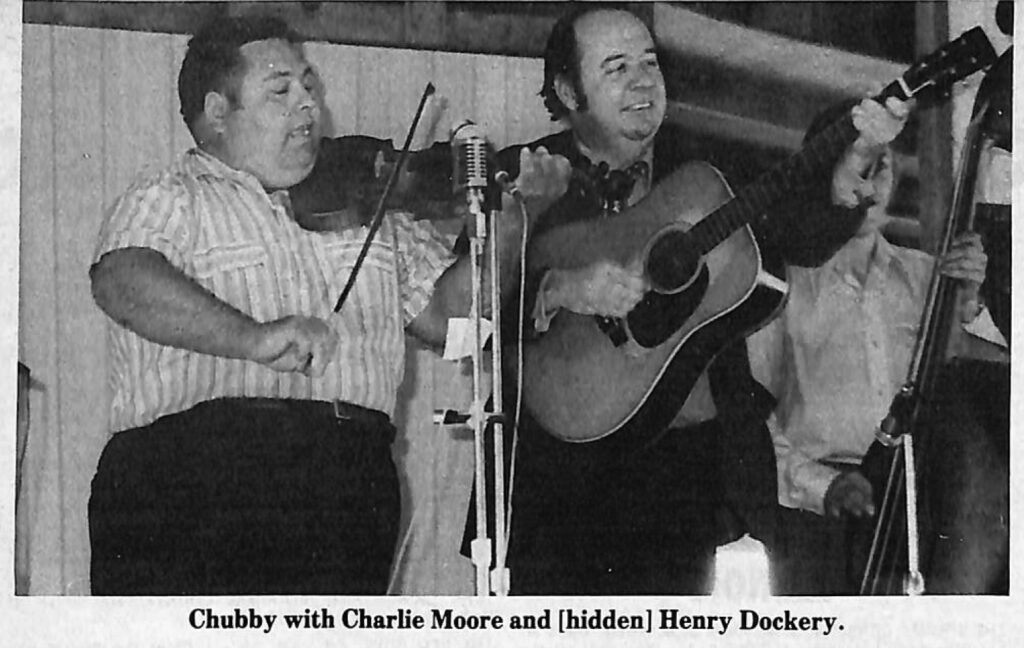
Anthony also credits B. L. Lindsey of Cherryville, North Carolina, and Roy Husky from Bryson City, North Carolina, with helping him achieve professional excellence.
“I learned early in life it was easier to get a job playing a fiddle than a guitar. Every time I started looking for a job, I found people wanted a fiddle player. My daddy had a band made up of people who lived in our area. Back then, we used to compete with other bands a lot, and we often won first prize. Many times that was $100, and in those days that was a lot of money.
“The first big thing I went to was an old-time fiddler’s convention. I went to local fiddle contests at Morganton, Mooresville and Shelby, but I never went to Union Grove. At the age of 13, I won the North Carolina State Fiddling Championship. The award was presented to me by Jim Shumate, a fiddler who worked with Lester and Earl. That meant a lot because I used to listen to Bill Monroe on Saturday night over the Grand Ole Opry and to Lester and Earl weekdays over radio stations in Raleigh, North Carolina and Bristol, Virginia/ Tennessee. I also listened to The Stanley Brothers over the Bristol station every day at 12:15.”
Anthony was 16 and still in high school when he was introduced to Carter and Ralph Stanley by John Shuffler and Lester Woody. The Stanleys offered Anthony a job with them, but it was short lived.
“I stayed with The Stanleys three months until I realized I had to go back home and learn more. I knew breaks, but I didn’t know how to do background music—fill-in music when the singers take breaths. So, I went back home and got a job sweeping the spinning room of the cotton mill. Naturally, that got old. It wasn’t what I wanted to do. I worked night times, slept part of the day and listened to all the records I could find. Carter Stanley called me in 1955 (about two years after Anthony’s first association with The Stanley Brothers) and asked me if I was still fiddling and if I had practiced. He then asked me if I’d meet them in Danville, Virginia that night, which was about 360 miles away.
“I went to Danville, and they took me behind a building prior to the show to see what I knew. As soon as they would call out a tune, we’d let it ride. When we got ready to leave after the show that night. Carter said, ‘You’re hired if you want the job.’ They wanted me to go on the road with them from that night on, but I told them I had to get some stuff back home.
“Carter said, ‘As insurance you will be joining us, we’ll take your fiddle.’ So, I went home, loaded my stuff and caught a bus to Bristol where they were doing the Fun ‘N’ Farm show over WCYB. It was there—the announcer for the show said it took too much to call me Donald Lee Anthony—that Carter said on the air, ‘We’ll call you Chubby.’ At the time I weighed about 215 pounds. I haven’t weighed since 1961, because my weight never has bothered me.
“I was with The Stanleys on and off for about 11 years. I’d take a vacation once in awhile and would later go back with them. Somebody would get their feelings hurt. Maybe I’d get my feelings hurt. With me, it’s tension.”
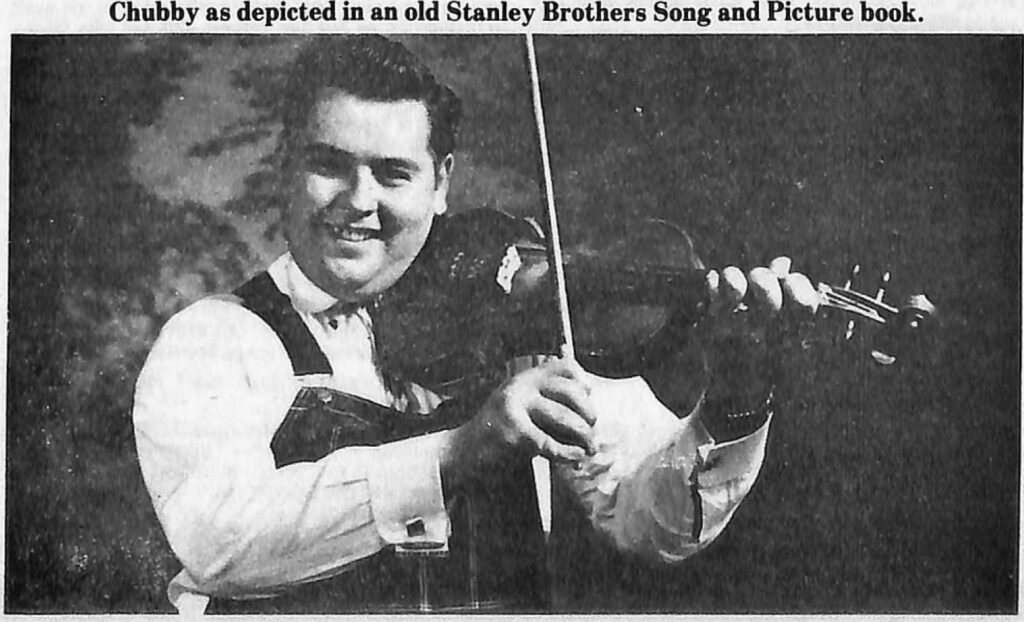
During one of those periods away from the Stanleys, Anthony met Charlie Moore, a very talented singer, songwriter and guitar player. Anthony worked with Moore in Asheville, North Carolina, doing a television show six hours each week and also with Moore’s band from time to time. Anthony’s fiddle playing and baritone singing can be heard on Moore’s recent “Wheeling” album (Old Homestead Records 90075).
In the late 1960s, Anthony decided to give up the road and quit playing professionally.
“I got disgruntled with it for awhile. There wasn’t a lot of bookings, and I felt like things weren’t going as they should. I was kind of at a standstill and wasn’t getting anywhere. From 1969 through 1974, I was out of the business. I had a job driving a laundry truck.”
Anthony was asked if that was exciting as being on stage receiving applause.
He replied, “No, but it was steady. I got a good paycheck every two weeks. I would rather have been on a stage, but, of course, a little pay helps keep you pacified and happy.”
In 1974, some friends including Johnny Norris of Lake City, Florida, and Tut Taylor talked Anthony into getting in a jam session at a White Springs, Florida, festival. The inevitable happened.
“I got it back in my blood, and I went to another Florida festival with a group. We won the second spot in the band contest, and I won the top fiddle spot. I decided right then to go back to music professionally.”
Anthony formed his own group “Big Timber,” in early 1978. It consists of Jimmy Fee on banjo. Bill Pruett on guitar, Bill Lamarche on bass and Anthony doubling on fiddle and guitar. “I think it’s the top group I’ve ever had. They work hard at putting a lot into a show.”
While we were talking at the record table, fans of Anthony’s music would come up and purchase albums from him. He would reach into a fruit cake tin to make change. At one point, a middle-aged man came to the table and asked for some barbecue chicken, obviously having the wrong table. As he was directed to the food area, Anthony remarked, “I should have told him we were fresh out; that we sold the last just awhile ago.”
Frequently at bluegrass festivals, Anthony conducts workshops for fiddle players. “I tell people to play a certain thing and work it out their way; try to do it with their best ability. The main thing people want to know is the correct melodies to songs. You can take three people and get them to play something and you may get three different melodies out of one song. Bluegrass music songs have been passed around and there are many variations of different tunes according to different parts of the country. In Texas, they may call a tune one thing, and here they’ll call it another.
“I’ve had accurate accounting for virtually all fiddle tunes. I had a friend of mine spend a lot of time in the Library of Congress in Washington finding out the correct versions. I know most of the authentic versions, but I ad-lib my way. When I show somebody, however, I like to show them the correct way.”
Since good guitar players often advocate learners practicing with old fiddle numbers, Anthony was asked if he recommended this method. “Yes, it’s good because you pick tunes up quicker and you do them cleaner. Again, though, that brings you back to the melody part. To play what you truly should be playing, you must learn the melody. A lot of people improvise too much and lose a lot of it. With my band, we try to keep it clean. We like to put a lot of drive in what we do instead of sleepy-time stuff, but that doesn’t mean we don’t like to do slow numbers.”
A short time before our conversation, Anthony had been on stage with Uncle Josh Graves doing “How Great Thou Art.” Anthony at one point took a break, laying down some soulful fiddle sounds with Graves’ top-grade Dobro sound coming in moments later. Graves told the crowd after that song, “Chubby is now going to play ‘Listen To the Mockingbird.’ There ain’t nobody who plays it like Chubby Anthony.” And true to form, Anthony made his fiddle sing.
“Are you a perfectionist?” came the question later.
Anthony smiled and replied, “I’d love to be, but I’m not. I try to get there as best I can do it.”
Another question followed: “Is there a perfect fiddle player?”
Again Anthony gave out with that warm smile then softly he answered, “No,
I don’t think so. I think some time or another, they all make a few mistakes. I know I do.”
